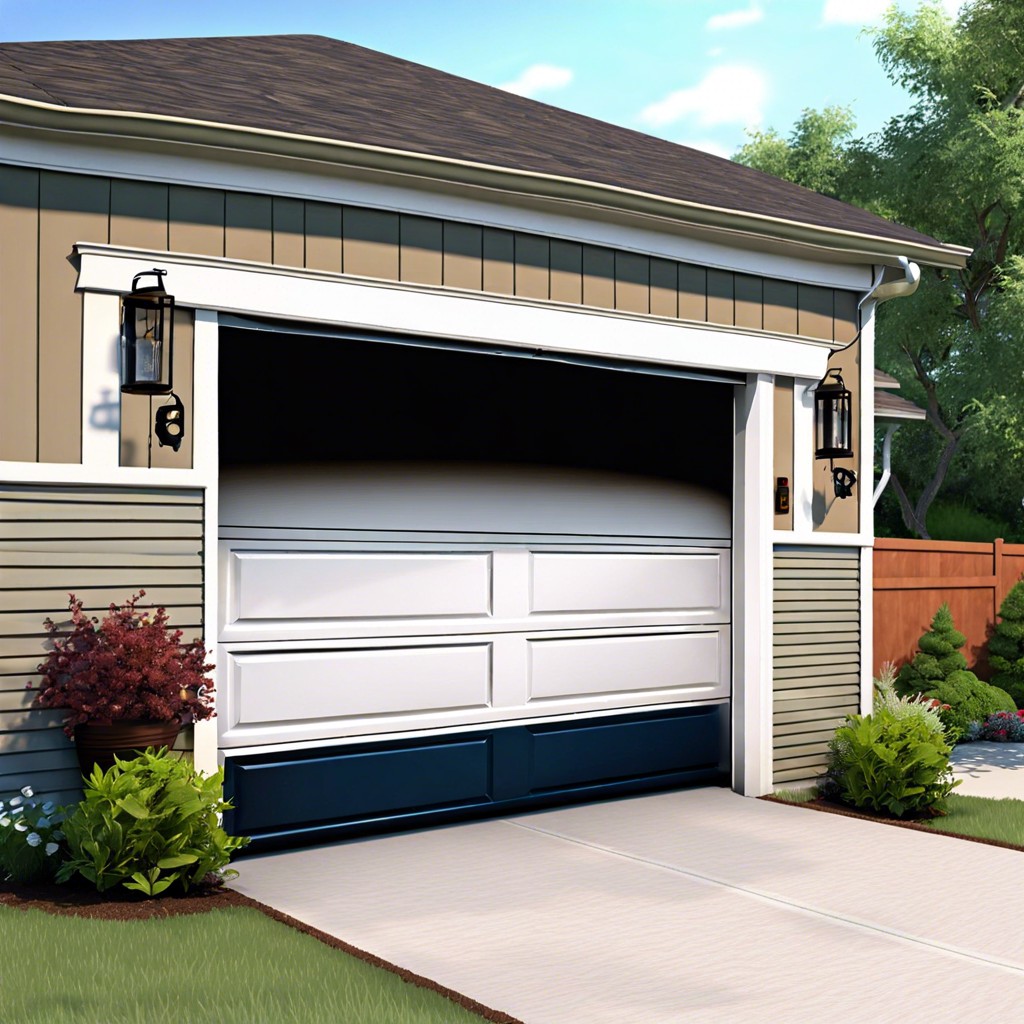Learn why your garage door stops midway when opening and how to troubleshoot tricky problems.
Key takeaways:
- Obstruction Alert*: Check for objects blocking door.
- Sensor Shenanigans*: Clean and align garage door sensors.
- Tension Trouble*: Check springs and cables for issues.
- Settings Gone Wild*: Adjust opener settings if needed.
- Professional Help*: Call experts for persistent issues.
Common Reasons for a Stopping Garage Door

Picture this: You’re halfway through your grand entrance into the garage when the door halts as if it’s auditioning for a dramatic scene in an action movie. Frustrating, right? Here’s why this might be happening:
*Obstruction Alert*: Sometimes, it’s the simple things causing the drama—check for any objects blocking the door’s path. Those beach chairs and bicycles just love making a surprise appearance.
*Sensor Shenanigans*: Modern garage doors are equipped with sensors that have the precision of a laser security system in a heist movie. If these sensors are misaligned or dirty, they might think your garage floor now has an invisible force field.
*Tension Trouble*: The springs and cables play critical roles in your garage door ballet. If one of them is out of whack, the door may stop mid-lift like a dancer who forgot their choreography.
*Settings Gone Wild*: Sometimes, the opener settings themselves are the culprits. If the door’s up-force or travel limits aren’t set correctly, the door might decide it’s had enough halfway through.
No need for a monologue about a broken garage door, but figuring out the key reasons can save you a lot of headache and grumbling.
Troubleshooting Tips
First, inspect the garage door tracks. Dirt, debris, and even tiny pebbles can cause major stoppages. Give them a good clean and a thorough look-over for any damage or misalignment.
Next, check the sensors. These little eyes can get just as dusty as your reading glasses. Wipe them clean and make sure they are aligned – they need to see each other to work.
Also, test the manual operation. Disconnect the opener and try lifting the door by hand. If it’s heavy or stuck, your springs or cables might be to blame.
Lastly, don’t ignore the opener’s settings. Adjusting the up-force or down-force can sometimes do miracles. If it still acts confused like an alien meeting a toaster, it might need a reset.
Sometimes it’s the small things that make a big difference.
Check for Items That Block the Garage Door Threshold
Sometimes the culprit might just be a rogue rake or an overenthusiastic garden hose. Ensure nothing is obstructing the garage door’s path. Even small objects can cause the sensor to stop the door from opening fully.
Take a walk along the garage door track and inspect it with eagle eyes. Fallen leaves, stray tools, or even the sneaky neighborhood cat might be the reason the door won’t cooperate. Look for anything unusual and remove it.
Also, double-check the photo-eye sensors. These little guardians can be pretty sensitive. Dust, dirt, or spider webs might create a force field, causing the door to halt. A gentle cleaning with a soft cloth can do wonders.
Keep the area clear, and your garage door should move smoothly again.
Check the Settings On the Garage Door Opener System
Sometimes, your garage door isn’t the rebel you think it is – it might just have a few settings a little out of whack.
Start with the limit settings. These controls dictate how far the door should go up or down. If the limit is set incorrectly, your door might think it’s hit the gym floor when it’s actually mid-air. A quick consultation with your garage door opener manual should help you locate and adjust these settings.
Look at the force settings next. These determine how much push or pull is needed for the door to move. If these are set too low, even a slight breeze might make your door throw in the towel.
And finally, if your garage door opener system has a manual reset option, give that a whirl. It might be like a good nap – sometimes a reset can fix all sorts of issues.
If all else fails and these settings don’t seem to be the culprit, it might be time to dig a little deeper or phone a friend with more knowledge.
When to Call a Professional for Help
If you’ve checked the common causes and your garage door still refuses to budge, it might be time to call in the cavalry. Here’s when to make that call:
Loud and unusual noises: Strange sounds might mean a mechanical issue that needs expert TLC.
Electrical problems: Sparking wires or flickering lights could mean trouble. Nobody wants a shocking experience.
Persistent stopping: If your door keeps halting despite your best efforts, a professional touch is needed.
Safety sensor issues: These high-tech gadgets sometimes need an expert to recalibrate or replace them.
Broken springs or cables: The heavy lifting should be left to those with the right tools and know-how. No one likes a trip to the ER.
So, when in doubt, get the pros out.